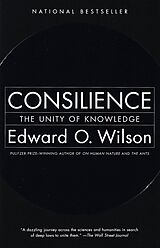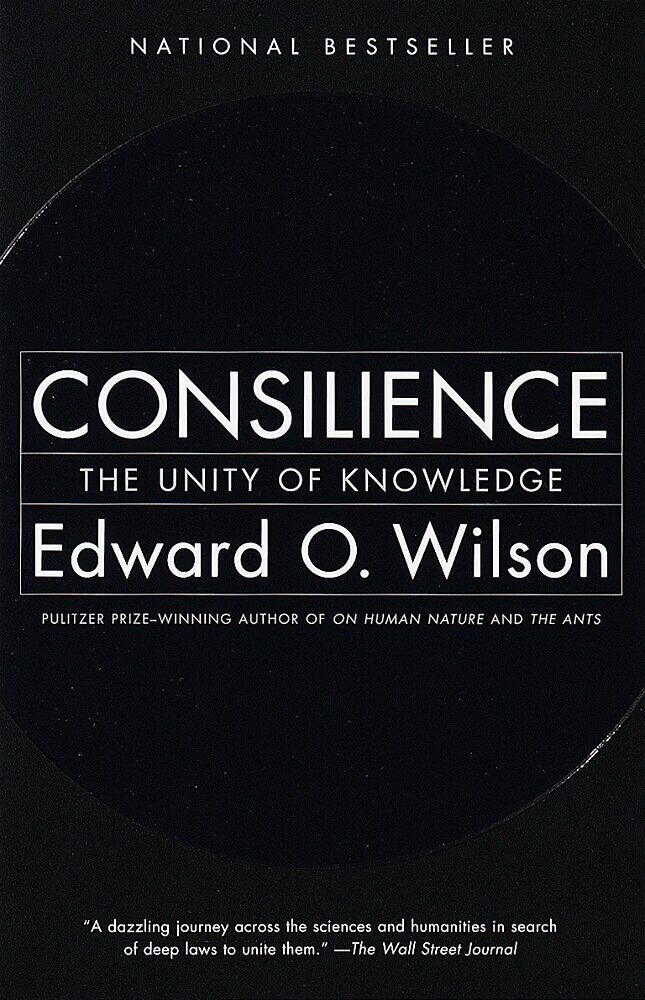Consilience
Einband:
Broschiert
EAN:
9780679768678
Untertitel:
The Unity of Knowledge
Genre:
Übrige Sachbücher & Sonstiges
Autor:
Edward O. Wilson
Herausgeber:
VINTAGE BOOKS
Anzahl Seiten:
367
Erscheinungsdatum:
30.03.1999
ISBN:
067976867X
Zusatztext "A dazzling journey across the sciences and humanities in search of deep laws to unite them." The Wall Street Journal "An original work of synthesis . . . a program of unrivalled ambition: to unify all the major branches of knowledgesociology, economics, the arts and religionunder the banner of science." The New York Times "As elegant in its prose as it is rich in its ideas . . . a book of immense importance." Atlanta Journal & Constitution "Edward O. Wilson is a hero. . . he has made landmark scientific discoveries and has a writing style to die for. . . . A complex and nuanced argument." Boston Globe "One of the clearest and most dedicated popularizers of science since T. H. Huxley. . . . Mr. Wilson can do the science and the prose." Time "An excellent book. Wilson provides superb overviews of Western intellectual history and the current state of understanding in many academic disciplines." Slate "The Renaissance scholar still lives. . . . A sensitive, wide-ranging mind discoursing beautifully. . . . Wilson's buoyant intellectual courage is bracing." Seattle Weekly Informationen zum Autor Edward O. Wilson was born in Birmingham, Alabama in 1929. He is the author of two Pulitzer Prize-winning books, On Human Nature (1978) and The Ants (1990, with Bert Hölldobler), as well as many other groundbreaking works, including Consilience, Naturalist, and Sociobiology. A recipient of many of the world's leading prizes in science and conservation, he was a Pellegrino University Research Professor and Honorary Curator in Entomology of the Museum of Comparative Zoology at Harvard University. He died in 2021. Klappentext "A dazzling journey across the sciences and humanities in search of deep laws to unite them." --The Wall Street Journal One of our greatest living scientists--and the winner of two Pulitzer Prizes for On Human Nature and The Ants--gives us a work of visionary importance that may be the crowning achievement of his career. In Consilience (a word that originally meant "jumping together"), Edward O. Wilson renews the Enlightenment's search for a unified theory of knowledge in disciplines that range from physics to biology, the social sciences and the humanities. Using the natural sciences as his model, Wilson forges dramatic links between fields. He explores the chemistry of the mind and the genetic bases of culture. He postulates the biological principles underlying works of art from cave-drawings to Lolita. Presenting the latest findings in prose of wonderful clarity and oratorical eloquence, and synthesizing it into a dazzling whole, Consilience is science in the path-clearing traditions of Newton, Einstein, and Richard Feynman. Leseprobe The Ionian Enchantment I remember very well the time I was captured by the dream of unified learning. It was in the early fall of 1947, when at eighteen I came up from Mobile to Tuscaloosa to enter my sophomore year at the University of Alabama. A beginning biologist, fired by adolescent enthusiasm but short on theory and vision, I had schooled myself in natural history with field guides carried in a satchel during solitary excursions into the woodlands and along the freshwater streams of my native state. I saw science, by which I meant (and in my heart I still mean) the study of ants, frogs, and snakes, as a wonderful way to stay outdoors. My intellectual world was framed by Linnaeus, the eighteenth-century Swedish naturalist who invented modern biological classification. The Linnaean system is deceptively easy. You start by separating specimens of plants and animals into species. Then you sort species resembling one another into groups, the genera. Examples of such groups are all the crows and all the oaks. Next you label each species with a two-part Latinized name, such as Corvus...
Autorentext
Edward O. Wilson was born in Birmingham, Alabama in 1929. He is the author of two Pulitzer Prize-winning books, On Human Nature (1978) and The Ants (1990, with Bert Hölldobler), as well as many other groundbreaking works, including Consilience, Naturalist, and Sociobiology. A recipient of many of the world’s leading prizes in science and conservation, he was a Pellegrino University Research Professor and Honorary Curator in Entomology of the Museum of Comparative Zoology at Harvard University. He died in 2021.
Zusammenfassung
NATIONAL BESTSELLER • "A dazzling journey across the sciences and humanities in search of deep laws to unite them." —The Wall Street Journal
One of our greatest scientists—and the winner of two Pulitzer Prizes for On Human Nature and The Ants—gives us a work of visionary importance that may be the crowning achievement of his career. In Consilience (a word that originally meant "jumping together"), Edward O. Wilson renews the Enlightenment's search for a unified theory of knowledge in disciplines that range from physics to biology, the social sciences and the humanities.
Using the natural sciences as his model, Wilson forges dramatic links between fields. He explores the chemistry of the mind and the genetic bases of culture. He postulates the biological principles underlying works of art from cave-drawings to Lolita. Presenting the latest findings in prose of wonderful clarity and oratorical eloquence, and synthesizing it into a dazzling whole, Consilience is science in the path-clearing traditions of Newton, Einstein, and Richard Feynman.
Leseprobe
The Ionian Enchantment
I remember very well the time I was captured by the dream of unified learning. It was in the early fall of 1947, when at eighteen I came up from Mobile to Tuscaloosa to enter my sophomore year at the University of Alabama. A beginning biologist, fired by adolescent enthusiasm but short on theory and vision, I had schooled myself in natural history with field guides carried in a satchel during solitary excursions into the woodlands and along the freshwater streams of my native state. I saw science, by which I meant (and in my heart I still mean) the study of ants, frogs, and snakes, as a wonderful way to stay outdoors.
My intellectual world was framed by Linnaeus, the eighteenth-century Swedish naturalist who invented modern biological classification. The Linnaean system is deceptively easy. You start by separating specimens of plants and animals into species. Then you sort species resembling one another into groups, the genera. Examples of such groups are all the crows and all the oaks. Next you label each species with a two-part Latinized name, such as Corvus ossifragus for the fish crow, where Corvus stands for the genus--all the species of crows--and ossifragus for the fish crow in particular. Then on to higher classification, where similar genera are grouped into families, families into orders, and so on up to phyla and finally, at the very summit, the six kingdoms--plants, animals, fungi, protists, monerans, and archaea. It is like the army: men (plus women, nowadays) into squads, squads into platoons, platoons into companies, and in the final aggregate, the armed services headed by the joint chiefs of staff. It is, in other words, a conceptual world made for the mind of an eighteen-year-old.
I had reached the level of the Carolus Linnaeus of 1735 or, more accurately (since at that time I knew little of the Swedish master), the Roger Tory Peterson of 1934, when the great naturalist published the first edition of A Field Guide to the Birds. My Linnaean period was nonetheless a good start for a scientific career. The first step to wisdom, as the Chinese say, is getting things by their right names.
Then I discovered evolution. Suddenly--that is not too strong a word--I saw the world in a wholly new way. This epiphany I owed to my mentor Ralph Chermock, an intense…

Leider konnten wir für diesen Artikel keine Preise ermitteln ...
billigbuch.ch sucht jetzt für Sie die besten Angebote ...
Die aktuellen Verkaufspreise von 6 Onlineshops werden in Realtime abgefragt.
Sie können das gewünschte Produkt anschliessend direkt beim Anbieter Ihrer Wahl bestellen.
Loading...
Die aktuellen Verkaufspreise von 6 Onlineshops werden in Realtime abgefragt.
Sie können das gewünschte Produkt anschliessend direkt beim Anbieter Ihrer Wahl bestellen.
| # | Onlineshop | Preis CHF | Versand CHF | Total CHF | ||
|---|---|---|---|---|---|---|
| 1 | Seller | 0.00 | 0.00 | 0.00 |
